
BERLINALE SPOTLIGHT 2016
Curated by Maike Mia Höhne
A selection of short films of the Berlin International Film Festival 2016 is traveling to different parts of the world, as part of “Berlinale Spotlight” programmes. This year’s movies of the Berlinale Shorts are merging into one body, one film essay. On top of each movie they allow a bigger endeavor to be explored: the desire for landing. Some return, some will never arrive. For instance in the short film “A Man Returned” by Mahdi Fleifel in which the 26-year-old Reda, having lacked of appreciation in Athens, returns to the Palestinian refugee camp from which he once fled. The protagonists of “Another City” are looking for a community and like-minded people within the anonymity of a metropolis. The Taiwanese short film “JIN ZHI XIA MAO” (anchoring prohibited) tells the story of two migrant workers who are trying to settle on the island. The selection of short films reflects the wide field of movie art, ranging from documentaries, essay and experimental movies to animations.
The Berlin International Film Festival, more commonly known as Berlinale, ranks among the most important film festivals in the world. Movies of all genres, lengths and formats are awarded. Since 2007, the Berlinale Shorts also awards prizes to short films, mostly works of talented young artists. (Goethe-Institut Vietnam)
Curator:
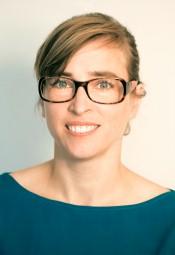
Maike Mia Höhne has curated Berlinale Shorts since the summer of 2007. She was born in Hanover in 1971. Between 1994-1999 she studied visual communication at the Hochschule für Bildende Künste in Hamburg, the Escuela de Bellas Artes in Havanna as well as the Escuela International de Cine y Television in San Antonio de los Baños, Cuba. After working in Buenos Aires, Argentina, she completed her post-graduate studies at the Hochschule für Bildende Künste in Hamburg with a focus on film. Since 2001, she has worked in as a freelance writer, curator, producer, photographer and director in various contexts. Her films are distributed by arsenal experimental and Kurzfilmagentur. She has also been active for many years as a lecturer and moderator at film events. Maike Mia Höhne lives in Hamburg and Berlin. (Photo by Simone Scardovelli)
BERLINALE SPOTLIGHT PROGRAMME I
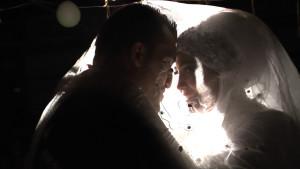
A Man Returned
30:00 min
Mahdi Fleifel, UK/Denmark/The Netherlands, 2015
“Are you busy?,” Reda asks his future wife on the phone. “I spend a lot of time thinking about our new life,” he says. “I mean, it might get really tough, our new life, and neither of us has tried it before. We’ll just have to make the impossible possible. With our love, our trust and our mutual understanding.” Reda is 26 years old. For the past three years he’s been living in Athens, hand-to-mouth and on petty crimes. He wanted to be recognised as a refugee in Europe. It didn’t work. Now he’s back at the place he originally fled from, Ain El-Helweh, the largest refugee camp in Lebanon. He is intent on creating a better life himself. The dream wedding will happen. The reality of the camp is the soil upon which the dreams are to sprout from. With drugs, or with drugs. With a war in Syria that can also be felt at the refugee camp. With confidence. For years now, director Mahdi Fleifel has been accompanying the men of his youth with a video camera in the style of Direct Cinema, thereby creating a proximity to his protagonists and their personal circumstances that could hardly be more immediate.
Born in Dubai in 1979, Mahdi Fleifel was raised in Ain El-Helweh refugee camp in Lebanon and later in the suburbs of Elsinore in Denmark. Graduating from the National Film and Television School in London in 2009, his short film Arafat & I was shown at festivals around the world; his first feature- length documentary A World Not Ours screened in the Berlinale Panorama in 2013 and received international awards. His short documentary Xenos premiered in Berlinale Shorts in 2014.
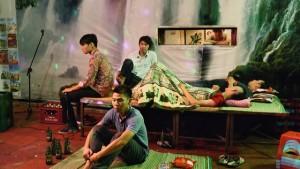
Another City
25:00 min
Pham Ngoc Lan, Vietnam, 2016
A drenched, middle-aged woman sits down on a blue plastic chair in a room undergoing renovation. Placing a bag of fresh vegetables beside her, she starts to blowdry her hair. Then she takes the wig off. A young man sings karaoke. Tears stream down his cheeks. The tropical waterfall is a wallpaper mural. And the dance begins. The protagonists in Another City search for opposition and togetherness. A well known Asian pop song unites the protagonists across time and space. In order to really meet, the city is the place that must be urgently abandoned.
Born in Hanoi, Vietnam, Pham Ngoc Lan studied urban planning at Hanoi Architectural University. His photographic and video work focuses on the influence of cityscapes on human relationships. His debut short film The Story of Ones screened in numerous film festivals and art museums, including Visions du Réel in Switzerland and at the Tokyo Metropolitan Museum of Photography in Japan. In 2015 he participated in the Short Film Station at Berlinale Talents.
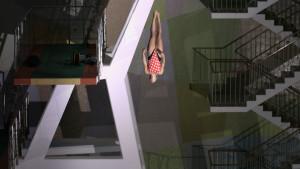
Hopptornet (Ten-Meter Tower)
17:00 min
Maximilien Van Aertryck and Axel Danielson, Sweden, 2016
The experimental set-up of the film is equivalent to a physical composition. But unlike physics, the conclusion is not predictable. Swimming pool. Interior. Day. 10-metre diving tower. The camera is focussed on the platform. The sound is set up for the audience to hear everything that happens, up there. Diverse people, alone, with a friend or partner, climb the tower, dare to walk to the edge of the board, look down and then pause. “Stick to your decision and jump,” she says. “There is no way that I’m going to run and jump. That’s for sure,” he says. What makes people jump? What is the meaning of such heights? What requires courage— diving off or climbing down backwards? The tension of observation can dissolve at the moment of the jump, better still at the moment of the scream. Relief for both sides. The calm remains.
Maximilien Van Aertryck was born in Paris, France in 1989 and he studied filmmaking in Sweden. He has been a member of Plattform Produktion in Gothenburg since 2013. Axel Danielson, born in Vittskövle, Sweden in 1976, was a fireman in Kristianstad before going on to study film at the Valand Academy of Arts at the University of Gothenburg in Sweden. He has been a member of Plattform Produktion since 2013.
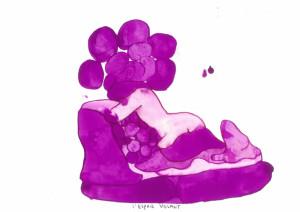
In the Soldier’s Head
4:00 min
Christine Rebet, USA/France, 2015
Bubbling machines, objects that turn, curious levers activated in nothingness, a woman on a divan, yes, no, disappears, reappears. Directly from the core of the imagined, those invisible thoughts are transformed on the screen into the concrete of the experienced, simultaneously setting the unyielding concept in motion. Images in the mind are superimposed by the destruction that is both colour and life. The ink transforms itself like a fuel-powered illusion, that begins and ends like a Fata Morgana—barely there, and then once again vanished. The synapses of a hyperactive psyche—transposed on paper. “Beyond eroticism, it was clear to me that I wanted to talk about cognitive fragmentation as a reflection of the collective experience of colonisation, and that I wanted to achieve that through the break with animation itself,” says Christine Rebet about her work.
Born in Lyon, France, Christine Rebet studied at Central Saint Martins in London and at Columbia University in New York. Her work combines painting, sculpture and performance and explores the concepts of audience and spectacle as well as the intersection between private and public space. She has taken part in numerous international film festivals and exhibitions.
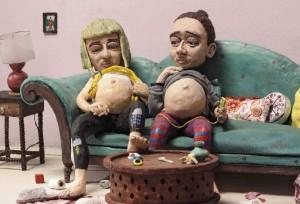
Moms on Fire
12:00 min
Joanna Rytel, Sweden, 2016
An ordinary neighbourhood in an ordinary town. Two women sit on a sofa and scratch their pregnant bellies. Four days till the due date. The situation is as unbearable as it is unavoidable. It’s simply intolerable Masturbation isn’t an option, the clitoris can’t even be reached, and the boyfriend is absent, but he’s boring anyway. The only advantage in having another child is that one no longer has to play with the first one. Artist and filmmaker Joanna Rytel uses claymation to candidly address questions and situations that usually go unnoticed.
Born in Warsaw, Poland in 1974, Joanna Rytel studied at the University College of Arts, Crafts and Design in Stockholm. Her films focus on controversial topics such as honour, racism, feminism, relationships between people and animals, taboos and sexuality in the public sphere, abortion and porn. In 2010 Joanna Rytel screened her film Unplay in the Berlinale Shorts section.
BERLINALE SPOTLIGHT PROGRAMME II

Balada de um batráquio (Batrachian’s Ballad)
11:00 min
Leonor Teles, Portugal, 2016
“Once upon a time, before people came along, all the creatures were free and able to be with one another,” narrates the voiceover. “All the animals danced together and were immeasurably happy. There was only one who wasn’t invited to the celebration—the frog. In his rage about the injustice, he committed suicide.” Something Romani and frogs have in common is that they will never be unseen, or stay unnoticed. In her film, young director Leonor Teles weaves the life circumstance of Romani in Portugal today with the recollections of a yesterday. Anything but a passive observer, Teles consciously decides to participate and take up position. As a third pillar, she establishes an active applied performance art that becomes integrated in the cinematic narrative. Thereby transforming “once upon a time” into “there is.” “Afterwards, nothing will be as it was and the melody of life will have changed,” explains a voice off-camera.
Born in Vila Franca de Xira, Portugal in 1992, Leonor Teles graduated in directing and cinematography at the National Film School in Lisbon and went on to complete a masters in audiovisual art and multimedia. Her student film Rhoma acans won awards at a number of festivals including Clermont-Ferrand, Munich and IndieLisboa. She currently works chiefly as a documentary filmmaker and cinematographer.
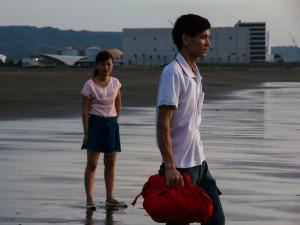
Jin Zhi Xia Mao (Anchorage Prohibited)
16:00 min
Chiang Wei Liang, Taiwan, 2015
Two labour immigrants lacking financial means, try to settle on the island of Taiwan. They always keep their child with them. In calm images and selected situations, the film tells of the lives of these three, who are representative of many. They strive to face their lack of prospects by taking a firm stand. They refuse to be discouraged. They carry on. But how can it go on? The little money they have is enough for one purchase— not more. The familiarity between them is in knowing the other’s each and every step. The life situation of labour immigrants in Taiwan is largely shaped by a legal vacuum that leads to severe dependence and often to enforced labour. In this film, director Chiang Wei Liang fully concentrates on the situation between the three. He has created a chamber piece that is set in a public space.
Born in Singapore in 1987, Chiang Wei Liang studied communications and began pursuing film at university. He is currently studying film directing and is an alumnus of the Golden Horse Film Academy which is mentored by director Hou Hsiao-Hsien.
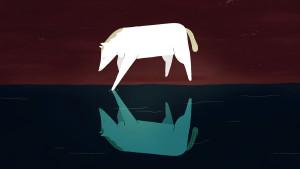
Love
14:00 min
Réka Bucsi, France/Hungary, 2016
“The English word “love” is not really a word anymore. It’s used for so many different platforms and situations that its shape and the lines of its letters have come to be recognised as a picture in itself,” explains director Réka Bucsi. Beyond all universal notions of love, in this film she depicts situations, moments, and tableaux vivants that with humour and surreal imagery—and along with the constellations of the stars themselves, give space to love. The stars circle round each other, the leaves spin the horses standing on them until they fall. The act of dissolving oneself in another is fulfilled by Narcissus when he lowers himself to the water. In every dark there is light. And every black is saturated with colour. The stars twinkle.
Born in Filderstadt, Germany in 1988, Réka Bucsi studied at the Moholy-Nagy University of Art and Design (MOME) in Budapest between 2008 and 2013. In 2011 she participated in the Essemble Digital Training Programme at the Universidade Lusófona de Humanidades e Tecnologias in Lisbon and in 2013 she attended Animation sans Frontiéres (ASF) in Viborg, Denmark, where she also participated in the Open Workshop artist in residency programme.
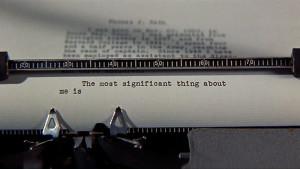
Personne
15:00 min
Christoph Girardet and Matthias Müller, Germany, 2016
A broken bottleneck lies on the ground. An analogue telephone with a blank dial plate. The hero of the film, Jean-Louis Trintignant, in younger years—in older years. A man huddled on an elevator floor. Skewered butterflies. He is all alone in the world. The external is sealed off. The internal barricaded. He shifts between times. His focus is always trained on the other. Is he wanted, condemned, persecuted? The man whom we observe from the rear, is only able to see his back in the mirror. His face cannot be recognised. All the actions and movements, all the seeking and striving, all the alterations and associations revolve around the view and excerpt from La Reproduction interdite, painted by Belgian surrealist René Magritte in 1937. The mirror axis of the film, and yet, and simply for that reason, one becomes the other. The other becomes many. “Personne —that is somebody and nobody and anyone. That is us in the course of time. Persistently, in vain. The self is the need for permanent self-assertion,” write Christoph Girardet and Matthias Müller.
Christoph Girardet was born in Langenhagen, Germany in 1966, he studied at Braunschweig University of Art and has collaborated with Matthias Müller since 1999 in the fields of film, video, installation and photography. He currently lives in Hannover. Matthias Müller was born in Bielefeld, Germany in 1961, he studied at Bielefeld University and Braunschweig University of Art. He currently divides his time between Cologne and Bielefeld. He has worked extensively in the fields of film, video, installation and photography.
